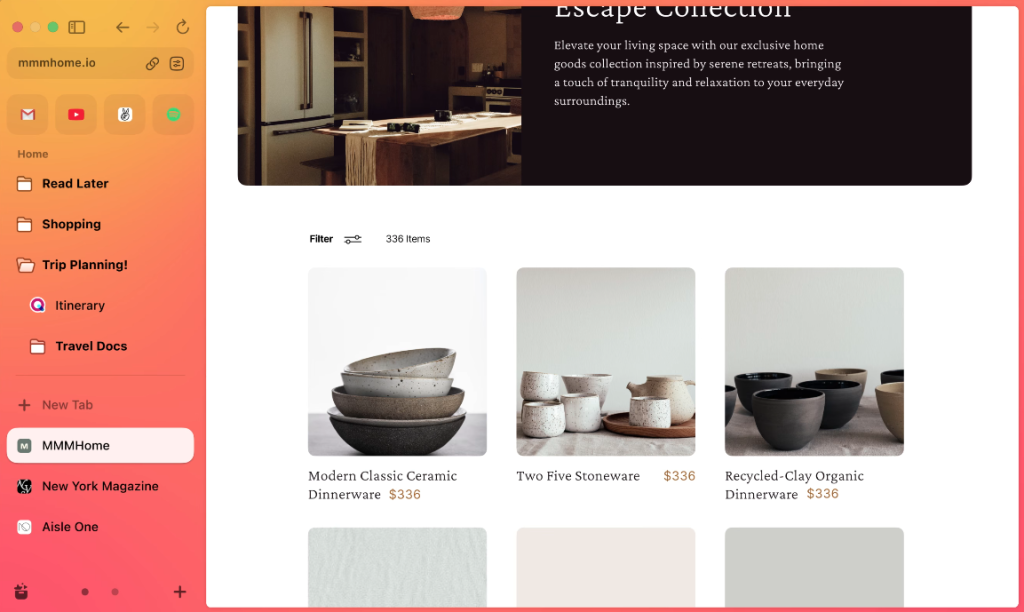Connected Thinking is Orchard's trends report, where we dissect the latest in culture, consumer, and healthcare to connect you to what's connecting us. This month, we've been buzzing about the great Bumble fumble, a slick new web browser, and Macmillan UK x Lovehoney's perfect partnership.
The trend
To tease their brand refresh and global campaign launch, Bumble replaced their Instagram with weary women in both art and real life. It felt bold, self-aware, and relatable. Bumble had seemingly grasped exactly how their target audience (women) were feeling—exhausted by dating (men).
But when the full campaign went live, the backlash was swift. Billboards declaring A vow of celibacy is not the answer and Thou shalt not give up on dating and become a nun were deemed tasteless, tone deaf, and completely contrary to Bumble’s aim of empowering women.
Bumble apologised and removed the ads, saying they were supposed to bring humour to "a community frustrated by modern dating".

The impact
Given the app was founded by women, it likely wasn’t Bumble’s intention to shame women. But it goes to show just how wrong a creative misdirect can go.
Bumble tried to tell women “We get you. We got you!” However, the campaign lacked clear positioning and a single, concise expression, resulting in a muddied message.
Brands attempting relatability while missing a key consumer insight risk being cringe and alienating. Bumble would have been better off addressing the real reason why straight women aren’t interested in relationships.
The trend
The enshittification of the internet describes to the gradual decline of a platform’s functionality as it becomes increasingly monetised and less user-oriented.
Still unsure what it means? Just try Google searching for a recipe online. Visit Amazon without encountering a pop up. Or head to how-i-experience-web-today.com for a painfully accurate parody of the modern internet experience.
Enter Arc—a new type of internet browser—designed to reduce the clutter in between what we’re searching for online. Unlike other browsers like Chrome and Firefox, Arc provides clean, calm and organised browsing experience.
Features include improved tab management, AI-powered browsing and a robust data privacy policy, Arc is an emerging piece of tech that can help deshittify the internet.

The impact
The development of Arc reflects a collective desire for more user-centric digital design. It’s clear people are feeling burnt by mega tech corps who once promised an exceptional user experience and robust data privacy.
And as the proliferation of generative AI only speeds up the enshittification process, what responsibility do we as marketers have to help preserve the integrity of the internet?
- User privacy and data protection are non-negotiable in any website, app or digital experience to build trust and transparency with users
- We must provide high quality content and resources to combat misinformation—ensuring relevancy, value, and trustworthiness
- Always prioritise UX over aggressive tactics—creating seamless, intuitive, and enjoyable interactions that cater to the needs and preferences of users
The trend
A study by Macmillan and YouGov found that nearly a quarter of people with cancer in the UK have serious concerns about sex, libido and fertility as a result of their diagnosis or treatment.
In response, the We need to talk about sex and cancer campaign shares real stories from people on how their cancer diagnosis impacted their sexual wellbeing - breaking down taboos and sharing advice on how to bring it up with healthcare providers, partners and friends.
“It’s a topic that’s hugely shrouded, stigmatized and people that are suffering from cancer really have not got the resources that they need.” said Nadia McCowan Hill, Lovehoney PR and Content Director.

The impact
Avoiding sensitive topics only perpetuates stigma and allows misinformation to spread. Healthcare campaigns must address what matters most to patients, providing the support and information they need.
As marketers, we can create material that helps patients to share their concerns, feel less alone, and seek help— fostering better understanding, conversations and care:
- Amplify real patient stories representing a broad spectrum of experiences, which are key to normalising discussions around sensitive health issues
- Identify specific myths and misconceptions and dispel these through factual content that is accessible and engaging
- Recognise the diversity of patient communities and ensure communications is appropriately adapted and culturally safe
This edition of Connected Thinking was curated by Orchard's Social Strategist Sophie Walter and UX Designer Hana Truong.

